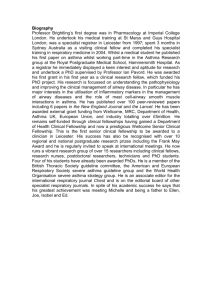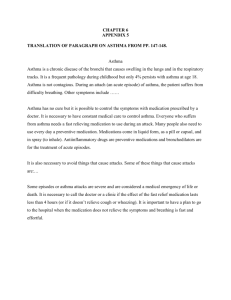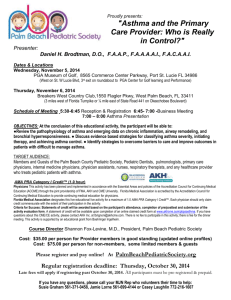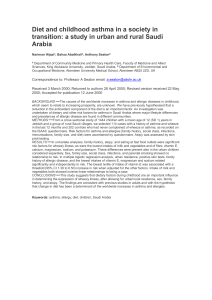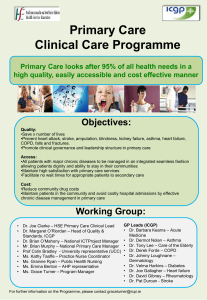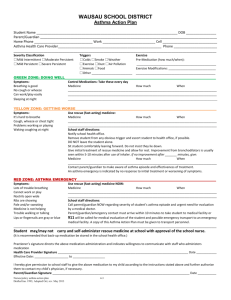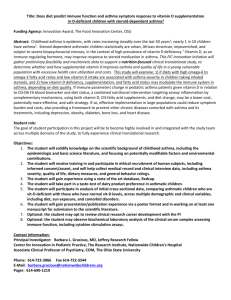File - Amber Madden
advertisement
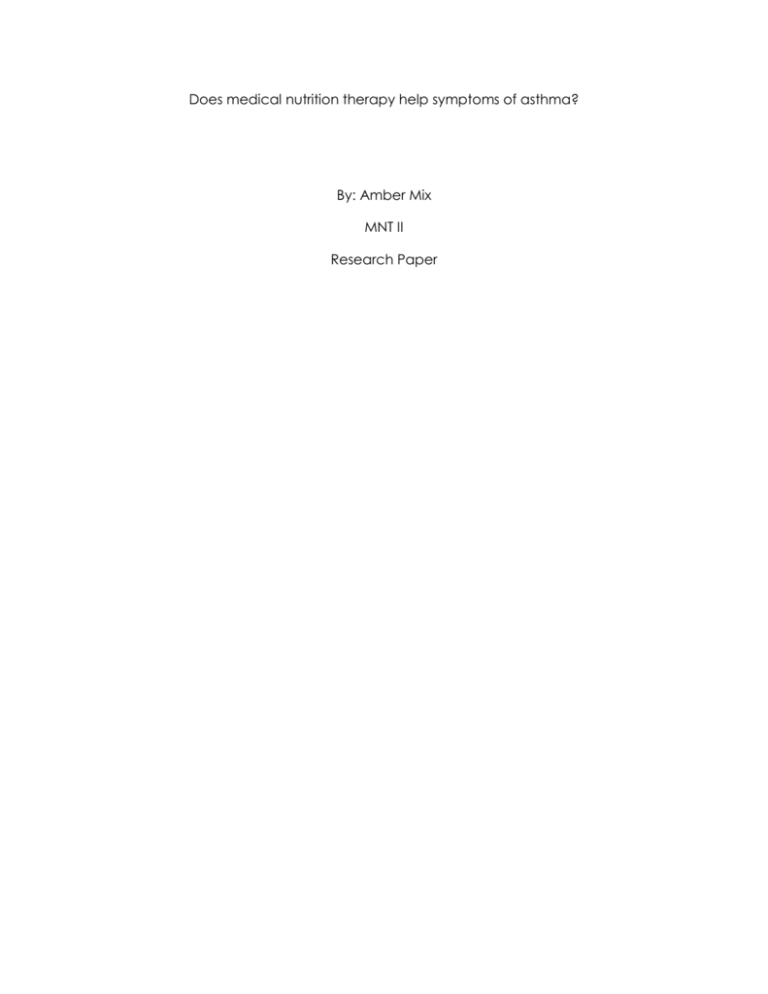
Does medical nutrition therapy help symptoms of asthma? By: Amber Mix MNT II Research Paper Introduction The reason I choose asthma as my topic for this clinical research paper is because I have been suffering with asthma ever since I was a child. My typical symptoms are wheezing, itching throat, coughing, and short of breath. The use of two different forms of medication are used to help control my asthma symptoms and prevent asthma attacks. This topic is important because many people are suffering from asthma just like me. According to the Centers for Disease Control, 1 in 12 people in the United States have asthma. Just like obesity and diabetes, asthma is increasing every year in the United States according to the CDC. I want to find out what other alternative methods there are to help people with asthma besides prescribed medications. The purpose of this paper is to find out what types of research has been done in regards to specific diets or nutrients that can help control asthma symptoms or prevent asthma attacks. Mediterranean Diet The first study I looked at was a short 12 week open-label randomized trial. There were follow-up sessions half way through the study and at the end of the study. This study had two goals. The main goal was to see how the subjects with asthma adopted to the introduction of the Mediterranean diet (MD). The second goal of this study was to examine the symptoms of asthma, quality of one's life, and systemic inflammation in the body before and after adopting to the MD. There were 35 subjects that finished the study. Subjects were divided into 3 groups. The groups were either high-intervention (HI), low-intervention (LI), or part of the control group. The HI group was given more intensive advice from dietitians, and got a total of 41-hr consultation sessions. They also were encouraged to adopt to the MD diet. The LI group was given much less intensive advice from a dietitian and got a 2-hr consultation. The control group was given one session with a dietitian. Both the HI group and LI group were given additional written advice, olive oil, and vouchers for the purchase of MD foods. There were different parts to the procedure of this study. The first part is they used a food frequency questionnaire (FFQ) at the start of the study and also at the end of the study. “Mediterranean diet score (MDS) was calculated from FFQ using the method described by Panagiotakos et al.”, (Sexton). The researchers also two other questionnaires, asthma-related quality of life questionnaire (AQLQ) and asthma control questionnaire (ACQ). The second part of procedures is that they performed spirometry at each follow-up visit. Lab measurements were assessed. Lab measurements included interleukin-6 (IL-6), IL-10, interferon-γ (IFN-γ), and tumor necrosis factor- α (TNF-α) in serum samples. Outcome measurements included the final MDS after adopting to the MD, and endpoints of the various questionnaires and spirometry. Results for clinical outcome measurements showed an increase statistical significance in MDS for the HI group (p < .001). The HI group reported an increase in the intake of fruits, vegetables, and fish, and a decrease in red meats, and chicken compared to the control group (Sexton). The LI group and the control group showed no significant changes in MDS. Also, there were no significant changes in ACQ or AQLQ during this study. There were no significant changes either in any of the inflammatory biomarkers examined. At the end of the study, the HI group showed a significant decrease in total cholesterol (TC) and low-density lipoprotein (LDL). At the end of the study, none of the measurements correlated with the MDS. There have been a small number of studies that focus on the reduction of asthma symptoms while adhering to the MD. This is more than likely the first interventional study of MD in asthma to be published. This study did fulfill their first goal with the HI group and making the MD easier to follow. The HI group increased their MDS and their TC and LDL cholesterol levels decreased which are effects of a Mediterranean diet. The LI group did not have a strong enough intervention for more significant results. The second goal of this study was not fulfilled. They did not measure any statistical significant improvements in the HI and LI groups regarding clinical benefits of MD diet. The MD may improve a person with asthma's' life but it may not improve their asthma. I think this study could have showed better results if the sample size was larger. Maybe the MD doesn't improve asthma significant but maybe it helps prevent asthma from existing. Also, this study could have had better results if the duration was longer. Nutrition Supplement In this study multi-nutrient supplementation on micro-nutrient status, oxidative stress and inflammation, immune response, pulmonary function, and health-related quality of life in patients with mild to moderate asthma. This study was open-label pilot study. There were 60 patients that were in this study. There were two groups in this study, the asthma group with mild to moderate asthma (n=30) and healthy patients (n=30). Daily dietary supplement was taken for 2 months. There was no placebo in this study. Daily dietary doses of multi-nutrient formulas were called green barley powder, oxy rich, omega rich, prime c complex, bio shield, and healthy life. Measurements taken were plasma concentrations of non-enzymatic antioxidants and plasma EFA's, plasma lipid peroxidation and inflammatory markers, erythrocyte enzymatic antioxidant activities, changes immune index and total serum IgE, asthma control test (ACT), changes in pulmonary function, and quality-of-life scores. These measurements were assessed at baseline, after 1 month of supplementation, and after 2 months of supplementation. The Guo et al results included asthma patients with a significant higher IgE, MDA, copper (CU), hs-CRP, and CD19 and CD4/CD8 lymphocyte ratios, and decreased selenium (Se), zinc (Zn), B-carotene, vitamins C and E, and catalase, glutathione peroxidase (Gpx) and glutathione reductase (GR) activities compared to healthy controls at baseline (3). “Asthmatics had non-significantly increased pulmonary function and a trend toward lower IgE levels, markedly reduced MDA, Cu, hs-CRP, and CD19 and CD4/CD8 ratios, and increases in levels of Se, Zn, B-carotene, vitamins C and E, and enzymatic antioxidant activities” (3). Also, both questionnaire scores increased significantly. In the end, nutritional supplementation may improve dysregulated oxidative and antioxidant status, inflammation and immune responses, pulmonary function, and health-related quality of life asthmatics (3). This study could have showed a stronger result if the sample size was larger. I believe this sample size was too small to get even better results. Not only did this study show an improvement in lab values but also in a person's quality of life with asthma. These subjects were put on all the dietary supplementation formulas. There was really no distinct supplementation. I think they should have had a couple more groups in the study to see which formulas worked better than the others. Vitamin and Mineral Treatment in Asthma There is no known cure for asthma, just medications to help with the symptoms and prevent future asthma attacks. Also, you can avoid asthma symptoms and attacks by staying away from possible triggers or irritants. Sometimes people might not even know what they are allergic to or sensitive to. With that being said, the cause of asthma is unknown. Avoiding triggers alone is a significant treatment for asthmatics. In recent studies, the focus on diet and asthma intervention is becoming more familiar. What this research has found is that antioxidants vitamin C, magnesium, and polyunsaturated fatty acids have been the majority of nutrients studied to date. When you have asthma, your air ways become inflamed and are more susceptible to oxidative damage. This is why antioxidants are good because they may help to reduce inflammation and asthma symptoms. The Singh et al (4) research has stated that the Murray (2001) study concluded that high-dose vitamin C therapy of 1-2g/day appears extremely effective based on the increasing exposure of inhaled oxidants in the respiratory system and helps lower histamine levels. Magnesium for example, has been shown to promote relaxation of the bronchial smooth muscles which then dilates airways and patients can breathe easier. Magnesium is best absorbed “when bound to citrate or aspartate and 25-75mg/kg doses of intravenous magnesium sulfate have been a well proved and clinically acceptable measure to halt acute asthma attacks and acute exacerbations of COPD” according to Singh et al (4). Also, oral supplementation of 280mg/day can improve bronchial airflow. Nutritional supplementation has not been well studied yet and further research is needed but we do know that there is a possibility that diet and nutrients may play a role is the control of asthma. Conclusion In conclusion, all 3 studies have shown that nutritional intervention may help asthma symptoms but research is still inconclusive. It is important to have further research about the effects of nutrition and asthma because many people are suffering with asthma. It makes sense that antioxidants can help protect the body from oxidative damage, specifically the inflammation in the airways. These studies were done with a small sample sizes and short durations and it is hard to make a decision on what is significant. Findings in these studies may have not been statistically significant but there was an improvement in the control of asthma. It would be interesting to see how children would be affected because these studies involved adults. I could apply this information to my future patients who have asthma to help them cope with their symptoms. References Sexton P, Black P, Metcalf P, Wall CR, Ley S, Wu L, Sommerville F, Brodie S, Kolbe J. Influence of Mediterranean diet on asthma symptoms, lung function, and systemic inflammation: A randomized control trial. Journal of Asthma. 2013; 50(1):75-81. Centers for Disease Control and Prevention. CDC Vital Signs. Asthma in the US. 4 May 2011. Available at: http://www.cdc.gov/vitalsigns/asthma, assessed May 6 2013. Guo C, Liu P, Lin K, Chen P. Nutritional supplement therapy improves oxidative stress, immune response, pulmonary function, and quality of life in allergic asthma patients: An open-label pilot study. Alternative Medicine Review. 2012; 17:42-56. Singh A, Feuerstein L. Vitamin and Mineral Treatment in Asthma. Townsend Letter. 2013; Feb/Mar: 70-72.


